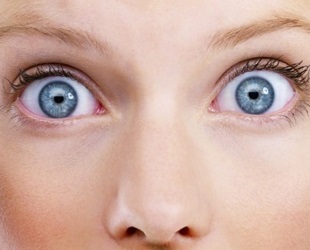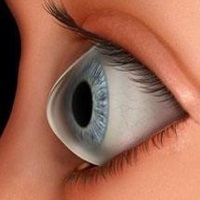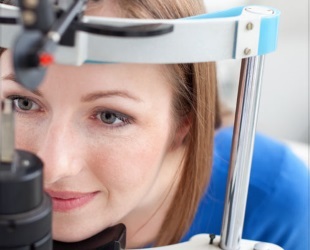
Unfortunately, there are a lot of different eye diseases: some of them can be determined only on special ophthalmological equipment, while others are clearly distinguished due to physical changes in the organ of vision.
Exophthalmos is a pathology that can be seen with the naked eye. With it, the eyeball protrudes forward, possibly shifting it to one side.
Disease is a secondary sign of some diseases of internal organs or an individual, inherent feature of the body.
- 1. What is exophthalmos
- 2. Causes of
- 3. Symptoms of
- 4. Diagnosis of
- 5. Treatment of
- 6. Prognosis of
- 7. Prevention of
- 8. Conclusion of
- 9. Video of
What is exophthalmos of
Whendisease in the retrobulbar space of the organ of vision, a gradual increase in the volume of tissues occurs, which contributes to the protrusion of the eyeball.
Pathological tissue development occurs due to inflammatory, traumatic or neurodistrophic changes of a local or general nature.
Euphorbia at the last stages of its development is noticeable to the naked eye. Pathology can progress both for several years, and develop over two to three weeks.
With considerable protrusion, the mobility of the eyeball is limited and vision deteriorates. With ophthalmic diseases, exophthalmus, as a rule, develops on one eye, with common diseases on both.
The disease develops regardless of the sex, age of the patient.
Classification
It is customary to classify the disease as imaginary and true.
- An imaginary exophthalmus is detected with congenital asymmetry of the orbits, widening of the eye gap, abnormal development of the cranium.
- True occurs with inflammatory, common diseases, injuries and tumors.
The nature of the course of the disease is divided into a constant, intermittent and pulsating.
- Permanent exophthalmos in most cases occurs due to neoplasms in the cavity of the orbit.
- Intermittent occurs due to the pathology of the orbital veins. For this form of the disease is characterized by the appearance of protrusion only at the time of physical stress, which increases the blood filling of the vessels of the eye.
- Pulsating form of the disease occurs with the development of an aneurysm of the arteries of the eye, injuries. A characteristic symptom is a pronounced and noticeable extraneous pulsation on the eye and fixation of noise in the upper part of the apple with a closed eyelid. Along with the main signs, headache, tinnitus are recorded. Later, the veins on the forehead and temples widen noticeably.
- The rapid development of is a hypothalamic-pituitary form of the disease, associated with an increase in the synthesis of pituitary hormones. Edema of the eyelids grows in a few days, conjunctival chemosis is detected, paresis of the oculomotor nerves develops.
Pain sensations, as a rule, are absent. Ophthalmic exophthalmos in case of diffuse toxic goiter can develop both with improper operation of the thyroid gland and after its complete removal, which is associated with hormonal imbalance.
Reasons for
Reasons are divided into general and local.
To local provoking factors include:
- Inflammatory processes in the eye socket or adjacent areas. For local reasons, also include injury to the eye, pathology of the veins of the eye, neoplasms in the eyeball.
- Common causes - diffuse goiter, hydrocephalus, abnormalities of the skull, diseases of the hematopoietic system. The provoking factor of exophthalmos may be inflammation of the sinuses.

Note - Keratoconus treatment. Effective integrated methods.
In the news( tyts) instructions for use on eye drops Aktipol.
Eye drops Arutimol!http: //moezrenie.com/lechenie/ kapli-dlya-glaz / pravila-ispolzovaniya-arutimola.html
Symptoms of

The clinical picture depends on the degree of protrusion of the eyeball. A hardly noticeable protrusion does not cause the patient any discomfort. As the pathology progresses, the following symptoms may occur:
- Edema and reddening of the sclera.
- Doubling in the eyes and decreased vision.
- Incomplete closure of the eyelids leads to the development of dryness of the sclera, resulting in the development of keratitis.
- The absence of movement of the eyeball or its strong restriction is a sign of a neoplasm or acute inflammatory process in the orbit.
- During examination, pathological changes in the fundus are revealed - hemorrhage, neuritis, nerve atrophy.
Prolonged compression of the optic nerve and its edema lead to complete blindness, which can not be further corrected.
Diagnosis
Only the ophthalmologist can diagnose exophthalmos by conducting a special study called exophthalmometry .It is performed using an exophthalmometer or a special ruler.
On the scale scale, the doctor determines the size of the cornea and compares the vertices of its protrusions. After this, the size of the ocular gap and the presence of any eye diseases in which the complete closure of the eyelids is impossible are taken into account.
Depending on these data, exophthalmos are divided into a mild, moderate and severe degree. Any values of the corneal size under exophthalmometry, which exceed 20 mm, and also 2 mm higher than the difference between the highest points of the protruding cornea, are anomalous. Expressed is the value of 28 mm.
In parallel with the procedure for measuring the size of the eyes, it is necessary to perform tests and studies of other organs that may be relevant to the problem: thyroid ultrasound, immune system status check, hormone analysis, checking the presence of abnormal processes in the eye sockets by isotope diagnostics and X-rays.
Treatment

The diagnosis is made on the basis of a clinical picture, anamnesis, a complete examination. Exophthalmometry allows to determine the degree of protrusion.
For successful treatment, it is necessary to establish the root cause of the pathology, therefore not only ophthalmologists, but also endocrinologists, otolaryngologists, neurosurgeons, therapists, neuropathologists are engaged in the patient.
The main direction of treatment is chosen based on the identified cause of the pathology.
- For diseases of the thyroid gland, treatment is carried out by an endocrinologist. Iodine microdoses, mercazolil, radioactive iodine are prescribed. The choice of the drug depends on the tests for hormones. Depending on the level of hormones, pulse therapy with prednisolone can also be prescribed.
- When inflammatory phenomena are used antibiotics, sulfonamides, vitamin therapy, sedatives.
- Pulsating exophthalmus in trauma is treated with a pressure bandage, which allows you to thrombolize the damaged vessel. Additionally, hemostatic agents are prescribed.
- Cancerous neoplasms are treated with chemotherapy, radiotherapy. Surgery is used to remove the tumor.
- If detection of compression of the optic nerve is decided on an operation aimed at reducing the pressure in the shells of the eyes. In some cases, only surgery can minimize the risk of developing complete blindness.

Read more - drops of artificial tear. Instruction and description.
In the article( here) test for color perception online.
Sivtsev's table!http: //moezrenie.com/poleznoe/testy/ proverka-zreniya.html
Forecast
Since in each case, the causes can be different, the forecast will depend:
- from a specific diagnosis;
- on the timeliness of the diagnosis;
- on the degree of expression of exophthalmos;
- on the correctness of the selected treatment;
- from individual features;
- from the totality of all of the above.
With a mild to moderate degree of exophthalmos, the prognosis may be favorable if the exact cause or cause of the disease is detected in time and corrected correctly by contacting specialists.
In any form of exophthalmos, a physician can recommend surgical intervention( plastic surgery), further actions will depend on the underlying cause of the eye disease.
Prevention
First and foremost, prevention should include a healthy lifestyle: proper nutrition, moderate exercise, avoiding bad habits, avoiding stressful situations;thus the immunity of the whole organism will rise.
Proper nutrition is often called among healthy lifestyle items. But in this case it is as relevant as possible. After all, one of the causes of exophthalmia is helminths, namely trichinella, which parasitizes in raw meat, often in swine fat.
If a doctor is being monitored for any disease, then all of his recommendations should be followed so that there are no complications in the disease that can occur in the disease of the organs of vision.
Should especially protect your head and eyes from injury during hazardous activities, monitor eye hygiene, in time to treat infectious and inflammatory diseases of the ENT organs, if you suspect a violation of the thyroid gland to undergo examination, to pass a general blood test.
Conclusion
Any disease can develop due to inattention to their health, this is the reason for the lack of time, and just a reluctance to change something. Exophthalmic also refers to such diseases, therefore, so that there is no risk to vision or even the risk of losing it completely, it is necessary to follow preventive measures, attend medical consultations.
If you are concerned about the health of the eyes not from scratch, but the doctor has not confirmed your doubts, visit another doctor to listen to several opinions and make a decision. Always the disease is easier to prevent and the chances will be much greater if the treatment is dealt with at an early stage of detection.
Video
Useful tips on how to maintain eye health:
